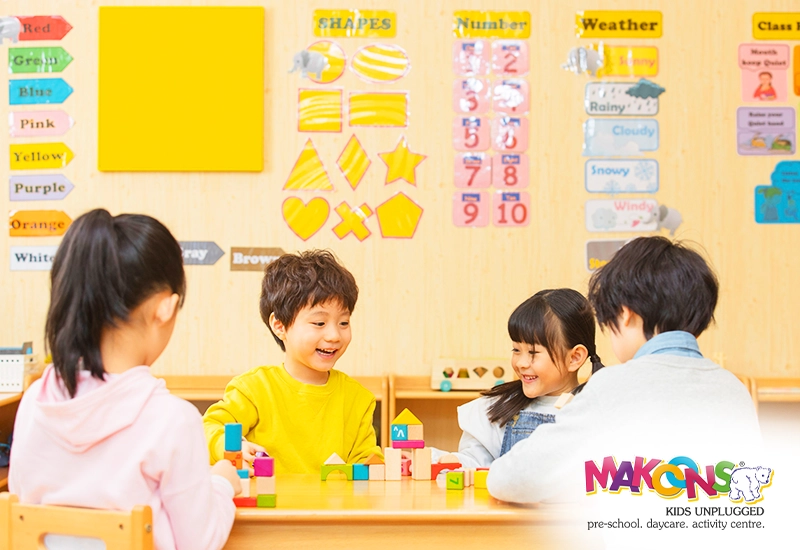As a parent, most likely you are thinking about what knowledge your child should have before starting nursery.Not to panic; you are not by yourself! Every parent experiences this time of enthusiasm tinged with anxiety. Let’s simplify what children should know in nursery terminology so you can assist your child to be ready for this major transition.
What’s the Nursery Syllabus in India Really About?
The Preschool syllabus in India is not as frightening as it sounds. Most schools concentrate more on leisure activities than on rigorous academics. Your three-four year child simply has to be ready for learning by play and exploration; they are not a mini-genius.
Consider the nursery as your child’s first voyage into the vast globe. Children who can sit for brief periods, pay attention to teachers, and play politely among classmates are sought in schools. That’s quite straightforward!
The ABCs of What Your Child Should Know-
Talking and Listening Skills
Your child should be able to chat with you easily.Can they describe their favorite toy? If yes, you’re on the right track!
Here’s what makes teachers happy:
- Your child can speak in small sentences like “I want water” or “This is my bag.”
- They can follow simple instructions like “Please sit down” or “Put your shoes here.”
- They love listening to stories and singing along to nursery rhymes
Don’t stress if your child is still working on some words. Every kid develops at their own pace. Just keep talking, reading, and singing together – it’s the best gift you can give them.
Number Fun and Shapes
Math for nursery kids isn’t about solving problems – it’s about having fun with numbers! This nursery learning guide suggests focusing on these basics:
Your little one should recognize numbers 1 to 10 (even if they can’t write them perfectly). They should understand “more” and “less” – like knowing that five cookies are more than two cookies.
Shape recognition is important too. Can your child spot circles, squares, and triangles around the house? Make it a game! “Look, the clock is round like a circle!”
Counting is everywhere – count stairs while going up, count toys while cleaning up, count fingers and toes during bath time. Early learning for kids happens best when it doesn’t feel like learning at all.
Knowing Their World
Pre-primary knowledge for children includes understanding their surroundings. Your child should know basic things like:
- Family members’ names (mama, papa, grandma, grandpa)
- Common animals and their sounds
- Different types of weather (sunny, rainy, cold)
- Basic safety rules (don’t talk to strangers, hold hands while crossing roads)
This does not mean they must be experts in everything.. Just the basics that help them feel confident about their world.
Life Skills That Matter–
Taking Care of Themselves
Here are some practical nursery play school education tips for parents: Focus on independence! Your child should be able to:
- Wash their hands without help
- Use the bathroom with minimal assistance
- Eat simple foods like sandwiches or fruits on their own
- Put on and take off their shoes (even if it takes forever!)
These skills matter more than knowing fancy words or complex math. Teachers appreciate kids who can manage their basic needs because it helps everyone have a better day.
Playing Well with Others
Social skills are huge in nursery. Your child should be able to:
- Say “please” and “thank you.”
- Wait for their turn during games
- Express when they’re upset instead of hitting or biting
Should your child find it difficult to share, don’t rush. Playdates or at home with siblings, practice. Remember, what kids should know in nursery includes being kind to friends, not being perfect.
Creative Fun and Physical Play–
Art and Creativity
Though your child should enjoy creative hobbies and Indoor activities for kids , they hardly need to be the next Picasso. Can they:
- Hold a crayon properly?
- Enjoy coloring (even if they go outside the lines)?
- Love dancing and singing?
- Use their imagination during play?
These exercises strengthen the little muscles in their hands, which babies will need for writing later.
Moving and Grooving
Every nursery learning guide incorporates physical development into its agenda.Your child should be able to:
- Run, jump, and climb safely
- Throw and catch a ball (sort of!)
- Use scissors with adult supervision
- Build towers with blocks
Don’t worry if they’re not athletic superstars. The goal is just to be comfortable moving their body and trying new physical activities.
How You Can Help at Home?
Make Learning Natural
The best nursery education tips for parents focus on making learning part of daily life. Here are some easy ideas:
Let your toddler count items or name colours as you prepare. During grocery shopping, name fruits and vegetables together. Read stories and discuss the visuals at bed.
Learning takes place everywhere, in the car, in the park, and at bath time.You do not need expensive toys or fancy applications.The best tools are your attention and communication.
You can Also Read- Superfoods for Kids to boost Immune System Naturally
Stay in Touch with Instructors
Contact your child’s teachers once they begin nursery. They can advise you on where your child might require more home practice and what they are doing well.
Remember, teachers are on your team.They want your child to succeed exactly as much as you do


